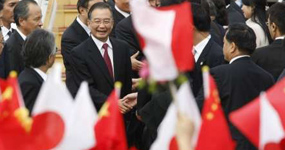
希拉里•克林顿(Hillary Clinton)上周六在越南举行的东亚峰会上与16个政府首脑会晤,本应发出一个强大的信号,表明美国与该地区恢复了接触。
但在抵达河内之际,这位美国国务卿发现自己恰逢中日矛盾死灰复燃,这使得峰会的其它一切黯然失色。一名西方外交官形容称,中国方面突然爆发的激烈言辞,以及在最后一刻取消日本首相和中国总理的正式会谈,无异于一次“伏击”,完全出乎日本外交人士的意料。
中国总理温家宝和日本首相菅直人(Naoto Kan)上周六的确在没有摄像机的场合,进行了短暂的“非正式会晤”。但在那之前,北京方面发出了一个强烈的讯息,取消了两国领导人之间的正式会谈,这本来将是9月初日本在有争议水域拘留一艘中国渔船船长以来,中日领导人的首次正式会谈。
出席峰会的会议代表和分析人士表示,北京方面的愤怒和不满似乎主要集中在一个人身上,即新上任的日本外相前原诚司(Seiji Maehara),他被视为中国问题上的鹰派人士,并支持日本与美国建立更紧密的联系。
中国分析人士表示,北京方面显然已断定,前原诚司是中日关系中的一个障碍,因此自他卸任国土交通大臣、改任外务大臣以来,正采取一切能够采取的行动来拆他的台。
前原诚司是在9月初日方扣留中国渔船船长仅几天后受命出任外相的。这名船长后来获释,但在此之前中日关系已恶化到了至少5年来最糟糕的水平。
亲北京的香港《文汇报》上周六在一篇社评中称,坚持要逮捕那名中国船长的正是前原诚司,社评还称他是一个麻烦制造者,应该被革职,理由是他损害了中日关系。
“前原诚司长期对中国发表不友好言论,采取不友好行动,自那次事件发生以来,他那些不负责任的言论对修补关系没有帮助,”南开大学中日关系专家宋志勇对英国《金融时报》表示。“中国不能向日本建议应该由谁出任其外务大臣,但是,如果要修补中日关系的话,前原诚司就必须改变他的态度。”
与此同时,日本媒体报道的解读是,上周末的事件反映了中国政府对于国内民众对日本看法的紧张程度。
近几周,中国多个城市爆发了反日抗议,北京方面不愿做出任何示弱举动,以免引发示威者将愤怒的矛头转向执政的共产党。
导致北京方面突然发出激烈言辞、并取消温家宝与菅直人会谈计划的,似乎是上周五上午前原诚司与中国外长杨洁篪的会晤。媒体报道援引前原诚司在会后的讲话称,中方已同意举行高层会谈,并就东海有争议的天然气田与日方重启谈判。日本官员后来否认前原诚司说过那样的话。
但中国外交部部长助理胡正跃指责日方就两国外长的商讨“散布不实之词”,从而“破坏了两国领导人在河内会晤的应有气氛”。
胡正跃还提到希拉里与前原诚司上周四在夏威夷举行的会晤,美国国务卿在会晤期间重申了美方的立场,即按照美日签署的条约,美方有义务协助日本防卫上述有争议的岛屿。这些无人居住的岛屿是中日关系紧张的核心原因。
胡正跃表示,日本方面在峰会之前和峰会期间的行动破坏了两国领导人会晤的应有气氛。
与此同时,据中国官方媒体报道,希拉里上周六在河内与中国外长举行了亲切友好的会谈。
译者/何黎
http://www.ftchinese.com/story/001035279

Hillary Clinton’s meeting with 16 heads of state at the East Asia summit in Vietnam on Saturday was supposed to be a powerful signal of the renewed engagement of the US with the region.
But on her arrival in Hanoi, the US secretary of state found herself in the midst of a flare-up in smouldering Sino-Japanese relations that eclipsed the rest of the summit. One western diplomat described China’s acrimonious outburst and last-minute cancellation of a formal meeting between the Japanese and Chinese prime ministers as an “ambush” that took Japanese diplomats completely by surprise.
Wen Jiabao, China’s premier, and Naoto Kan, the Japanese prime minister, did get together for a very brief “unofficial meeting” away from the cameras on Saturday. But that was only after Beijing had sent a strong message by cancelling what would have been the first official meeting between the two leaders since a spat that began in early September when Japan detained a Chinese fishing boat captain in disputed waters.
Delegates to the summit and analysts said Beijing’s anger and resentment appeared to be directed mostly at one man: Seiji Maehara, Japan’s newly appointed foreign minister who is regarded as a China hawk and supporter of closer ties with the US.
Chinese analysts said Beijing had clearly identified Mr Maehara as an obstacle in Sino-Japanese relations and was doing everything it could to undermine him since he stepped down as transport minister to take up his post.
His move came just days after the arrest of the Chinese fishing boat captain in early September. The captain was later released but not until Sino-Japanese relations had deteriorated to their lowest level in at least five years.
On Saturday an editorial in Wen Wei Bo, a pro- Beijing newspaper in Hong Kong, said it was Mr Maehara who had insisted on the arrest of the Chinese captain and called him a troublemaker who should be dismissed for harming Sino-Japanese relations.
“Maehara has a long history of unfriendly words and actions towards China and since the incident his irresponsible comments have not been helpful in repairing relations,” Song Zhiyong, an expert in Sino-Japanese relations at Nankai University, told the Financial Times. “It’s not up to China to recommend who Japan should appoint as their foreign minister but Maehara must change his attitude if Sino-Japanese relations are to be repaired.”
Meanwhile, Japanese media reports have interpreted the weekend’s incidents as a reflection of the nervousness of the Chinese government about domestic opinion towards Japan.
Anti-Japanese protests have broken out in cities across China in recent weeks and Beijing is loath to show any weakness that could prompt demonstrators to direct their ire at the ruling Communist party.
The trigger for Beijing’s outburst and cancellation of the planned meeting between Mr Wen and Mr Kan appeared to be a Friday morning meeting Mr Maehara held with his Chinese counterpart, Yang Jiechi. Media reports quoted Mr Maehara afterwards as saying China had agreed to a high-level meeting and to restart talks with Tokyo over disputed gasfields in the East China Sea. Japanese officials later dismissed suggestions he had ever made such a claim.
But Hu Zhengyue, an assistant Chinese foreign minister, accused Japan of “ruining the atmosphere” for a planned Wen-Kan summit by making “false statements” about the foreign ministers’ discussions.
Mr Hu also referred to a meeting between Mrs Clinton and Mr Maehara in Hawaii on Thursday, in which the secretary of state restated the US position that it was bound by treaties with Japan to help defend the disputed uninhabited islands at the heart of Sino-Japanese tensions.
“[Japan’s] actions before and during the summits have damaged the atmosphere between the leaders of the two countries,” Mr Hu said.
Meanwhile, Mrs Clinton’s meeting with the Chinese foreign minister in Hanoi on Saturday was cordial and polite, according to Chinese state media.
没有评论:
发表评论